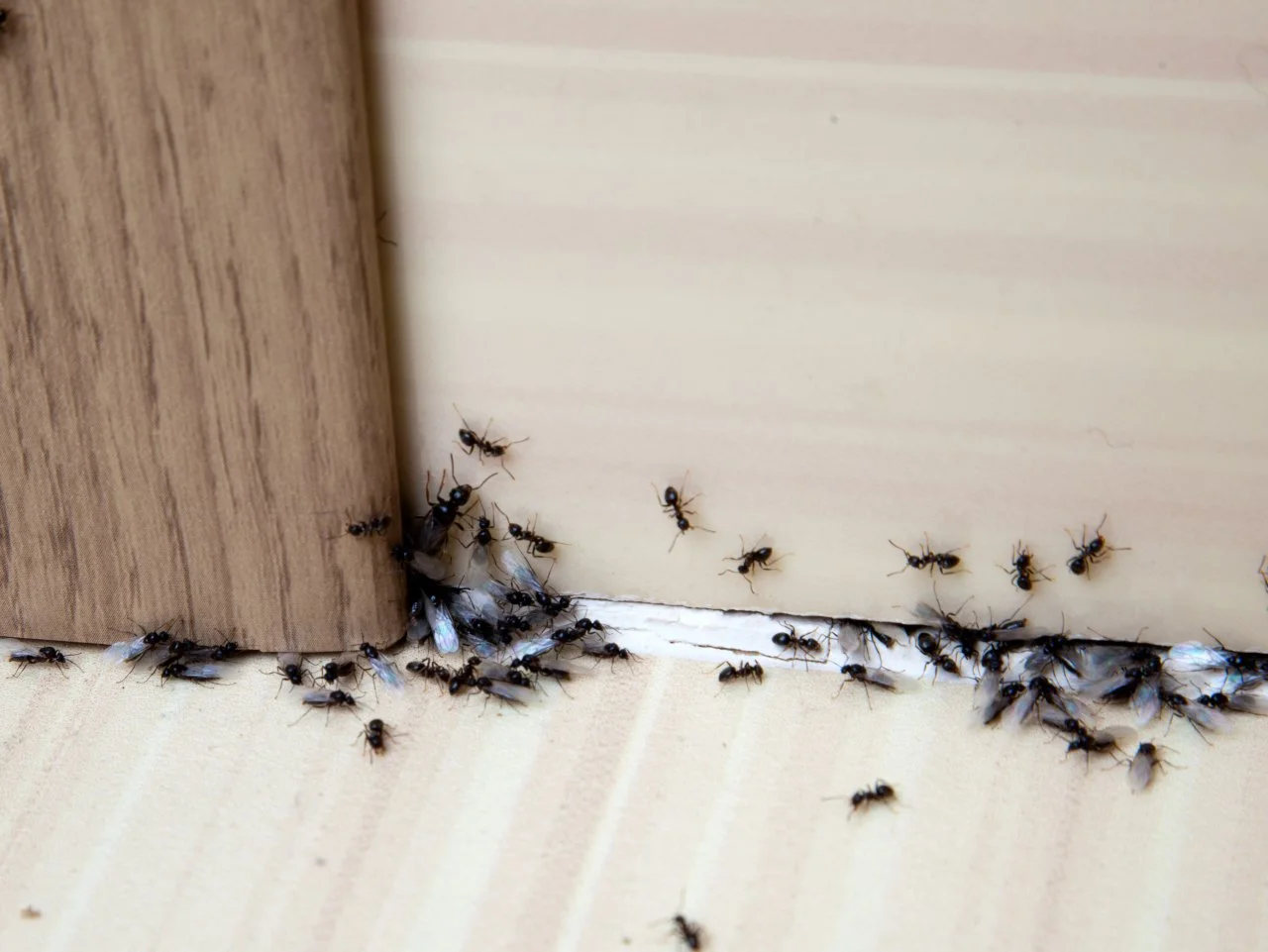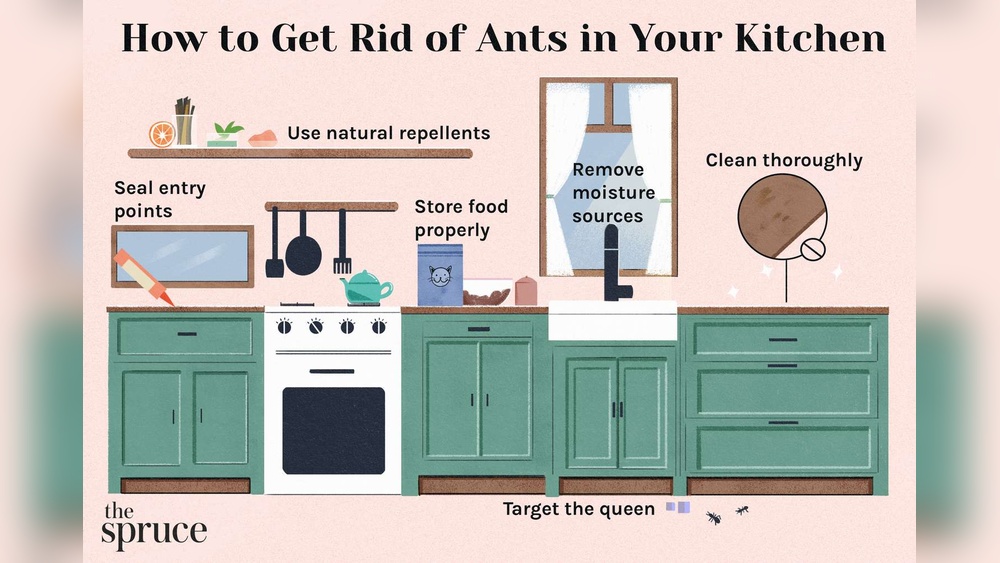Are small ants invading your kitchen and making it hard to enjoy your space? You’re not alone, and the good news is you don’t have to live with these tiny intruders.
Understanding how to get rid of small ants in your kitchen is key to reclaiming a clean, ant-free environment. You’ll discover simple, effective steps you can take right now to stop ants in their tracks. Whether you prefer natural remedies or quick fixes, you’ll find practical solutions tailored to your needs.
Keep reading to learn how to protect your kitchen from ants once and for all!
Identify Ant Types
Common kitchen ants include small black ants, odorous house ants, and pharaoh ants. These ants are often attracted by food crumbs, grease, and sugary spills. Small black ants are usually the most common and enter homes searching for sweet or greasy food.
Behavior patterns vary. Some ants create visible trails on countertops or floors. Others hide inside walls or under cabinets. Ants leave a scent trail for others to follow, which makes the problem grow fast. They can enter through tiny cracks or gaps near windows and doors.
| Ant Type | Size | Food Preference | Behavior |
|---|---|---|---|
| Small Black Ant | 1/16 inch | Sweets, grease | Leave scent trails, form large colonies |
| Odorous House Ant | 1/10 inch | Sugary and greasy foods | Emit smell when crushed, nest indoors |
| Pharaoh Ant | 1/16 inch | Sweets, proteins | Build nests in hidden spots, multiply quickly |
Find Entry Points
Check all doors and windows for tiny gaps. Ants use these to enter your kitchen. Look closely at the edges and frames. Seal any holes or broken seals with caulk or weather stripping.
Cracks and crevices in walls or floors are common entry points too. Use a flashlight to spot small cracks near baseboards or cabinets. Clean these areas well and fill cracks with putty or sealant.
Blocking these entry points helps stop ants from coming inside. Keep these areas dry and clean to avoid attracting ants. Regularly inspect and fix new cracks or gaps.
Clean Kitchen Thoroughly
Remove food sources to stop ants from coming into your kitchen. Store all food in sealed containers. Do not leave crumbs or spills on counters or floors. Ants are attracted to even the smallest bits of food.
Wipe surfaces regularly using warm, soapy water. Clean areas like countertops, tables, and sinks every day. This removes any food residue and ant trails. Ants follow scent trails left by others, so cleaning breaks these trails.
Take out the trash often and keep bins clean. Avoid leaving pet food out for long periods. Keep kitchen floors swept and mopped to remove sticky spills or crumbs.
:max_bytes(150000):strip_icc()/TheSpruce_Howtogetridofandpreventodoroushouseants_colorv1-d55f1b3ffb8f44e1a34ba6d0a07bd4a0.png)
Use Natural Remedies
Vinegar works by masking ant scent trails. Ants use these trails to find food and return to their nests. A mixture of equal parts vinegar and water sprayed on entry points like doorways and windowsills confuses ants and keeps them away for a short time. The smell fades quickly, so reapply often for best results.
Baking soda mixed with sugar creates a simple bait. Ants eat the sugar and carry the baking soda back to their nest. Baking soda reacts inside their bodies and helps kill the colony. Sprinkle this mix near ant trails or where you see ants.
Lemon juice is a natural cleaner and ant repellent. Its strong smell disrupts ant scent trails like vinegar. Use fresh lemon juice on door frames, counters, and other places where ants enter. Lemon juice also cleans surfaces and removes food smells that attract ants.
Apply Diy Ant Baits
Sugar and Borax baits attract ants with sweetness. Mix 1 part borax with 3 parts sugar. Add water to make a thick paste. Place small amounts near ant trails or entry points. Ants carry the bait back to their nest. This slowly kills the colony.
Peanut Butter baits work well for protein-loving ants. Mix peanut butter with a bit of borax. Spread it on a small piece of cardboard or lid. Set it where ants are active. The ants take the bait home, helping to reduce their numbers over time.

Seal Entry Points
Use caulking to close cracks and gaps around windows, walls, and pipes. This stops ants from entering your kitchen through tiny holes. Apply caulk carefully along edges where ants might sneak in. Make sure the caulk dries fully before checking for new ant trails.
Install door sweeps at the bottom of exterior doors. These blocks prevent ants from crawling under doors. Choose door sweeps that fit tightly and seal gaps completely. Check them regularly for damage and replace if needed. A good seal keeps ants outside where they belong.
Maintain Dry Environment
Fixing leaks stops water from pooling. Ants need water to survive. Leaky pipes or faucets invite ants inside. Check under the sink and near appliances often. Use plumber’s tape or call a professional to fix leaks fast.
Reduce moisture by keeping kitchen surfaces dry. Wipe counters and floors after cooking. Don’t leave wet sponges or cloths around. Store food in sealed containers to avoid spills. Good airflow helps dry damp areas quickly. Moisture attracts ants searching for water.
When To Use Chemical Solutions
Choose insecticides that are labeled safe for kitchen use. Avoid harsh chemicals near food areas. Read the product label carefully to ensure safety. Opt for products that target ants but are less harmful to humans and pets.
Follow all application guidelines on the packaging. Use the recommended amount only. Overuse can cause health risks and may not improve results. Apply insecticide in cracks, crevices, and ant trails where ants enter.
Wear gloves and keep children away during application. Do not spray directly on food or utensils. Ventilate the area well after use. Wait the suggested time before allowing contact with treated surfaces.
Prevent Future Infestations
Keeping the kitchen clean is crucial to stop ants. Wipe countertops and sweep floors daily. Avoid leaving dirty dishes in the sink. Clean up spills immediately to remove food traces. Regularly take out the trash and keep bins sealed tight. These simple steps reduce ant attraction.
Store food in sealed containers to block ants’ access. Use plastic or glass jars with lids. Keep fruits and snacks in the fridge when possible. Avoid leaving pet food out for long periods. Proper storage cuts off ants’ food sources and stops them from coming back.

Frequently Asked Questions
How Long Will Vinegar Keep Ants Away?
Vinegar keeps ants away for a few hours to a few days by masking their scent trails. Reapply regularly for best results.
What Is The Best Homemade Ant Killer For The Kitchen?
The best homemade ant killer for the kitchen is a mixture of equal parts white vinegar and water. Spray entry points and wipe trails to disrupt ants’ scent. Reapply regularly for ongoing effectiveness. This solution deters ants but does not kill the entire colony.
How Do Small Ants Enter The Kitchen?
Small ants enter through cracks, windows, doors, and any tiny openings near food sources.
What Natural Remedies Repel Kitchen Ants Effectively?
Vinegar, lemon juice, and cinnamon disrupt ant trails and keep them away naturally.
Conclusion
Small ants in the kitchen can be annoying and persistent. Regular cleaning and removing food crumbs help keep them away. Using natural sprays like vinegar disrupts their scent trails. Seal entry points to stop new ants from coming inside. Remember, patience and consistency are key to success.
Follow these simple steps to maintain a clean, ant-free kitchen. Your effort will make your home more comfortable and hygienic. Keep trying, and the ants will soon disappear for good.

Yes, working as , Food Blogger and Product Reviewer for last 6 years. Here you will get amazing deals for Smart kitchen products. I am your best source for the latest update in cooking trends. I provide insightful articles, reviews, and analysis on cutting-edge kitchen gadget. My mission is to empower readers with the knowledge they need to stay ahead in a rapidly evolving coking world. Join me as we explore the future of food technology and how it shapes our lives today and tomorrow.





